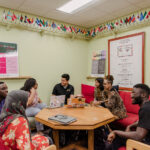
It’s a cozy space decorated in lively yellows, blues, and reds, a perfect representation of the dynamic individuals present and the discussions taking place here, coloring the UMBC campus. The Mosaic: Center for Culture and Diversity makes its home on the second floor of The Commons and has been an influential presence, shaping conversations at UMBC for the past 15 years.
Immediately behind the front desk sits a roundtable area—an inviting corner for group meetings, events, or simply a spot where students can come chat and unwind in between classes. On this day, eight of the center’s interns sit in its space, offering up generous amounts of finger-snaps and support as they each recall what initially drew them to The Mosaic. While each intern differs in graduation year, major, and internship specialization, the thread that binds them together is the warmth and immediate acceptance they felt when first introduced to Mosaic and its community.
For Sylvia C. Anokam ’20, gender, women’s, and sexuality studies, and Mosaic Intern for Black and Africana Student Engagement, the center is integral in helping to develop her sense of purpose both in and outside of UMBC. “As I started working at Mosaic, I started thinking about all the various identities that I hold,” said Anokam. “I know I’m a woman and I’m a black woman, but I never thought of my immigrant identity and how it played a role in my life.” This past February, Anokam participated as a panelist in the Mosaic’s Fifteenth Anniversary Celebration where she shared her journey with other students, faculty, alumni, and guests.
 Becca Mann (left) and Karina Aquiahuatl Villagran (right) hug at the 15th anniversary celebration.
Becca Mann (left) and Karina Aquiahuatl Villagran (right) hug at the 15th anniversary celebration.
In its 15 years, The Mosaic has grown to include Associate Director for Student Diversity and Inclusion Lisa Gray; two Coordinators for Student Diversity and Inclusion, Carlos Turcios ’15, psychology and sociology, M.A. ’17, applied sociology, and Erin Waddles; 10 student staff; and two additional sister spaces—Campus Life’s Interfaith Student Lounge and Campus Life’s Queer Center.
Turcios, who originally joined The Mosaic as the first Intern for Hispanic and Latinx Student Community Outreach, believes UMBC’s practice of inclusive excellence, as well as the sociopolitical challenges present in our country over the past few years, have helped to bring focus to the crucial social justice and intersectional based work being done by The Mosaic. As students and their families affected by travel bans and Deferred Action for Childhood Arrivals (DACA) deal with the ongoing policy changes, The Mosaic has maintained an inclusive and supportive environment for anyone looking for a place to speak freely. And while The Mosaic stresses that the staff are not counselors, they believe in fully supporting their student community however they can.
Among the many educational, outreach, and training programs developed by The Mosaic, there is What’s the T? A Social Justice Dialogue Series and How to Be a Better Ally: Workshop Series, both of which use Brave Space Guidelines as their foundation. Originally created by The Women’s Center, The Mosaic’s key partner, Brave Space Guidelines assist in fostering meaningful, social justice-based conversations that promote accountability and learning from a place of positive intent. “[Brave spaces] allow us to address things that might seem small to the folks who are saying it but have a larger impact if they keep using those terms,” said Turcios.
Going forward in the next 15 years, Waddles, Turcios, and Gray hope that the growing recognition The Mosaic is receiving will result in increased staffing and resources, all of which will aid them in providing larger spaces and innovative programming for their students and community.
“My hope is that we work our way out of a job.” says Gray, who has led The Mosaic’s mission for more than 12 years. “There will not need to be a need for these spaces anymore, because the entire campus will be The Mosaic.”
As the interns wrap up their group discussion for the day and head to other obligations, Hispanic, Latinx, and Indigenous Student Engagement Intern Karina Aquiahuatl Villagran ’19, individualized studies, offers one final sentiment, perfectly summing up the empowered collective voice of The Mosaic community: “I love The Mosaic because I can have real conversations here. Society has normalized keeping the difficult conversations to ourselves, but Mosaic is a part of society and it can branch out from this space to whatever we do in the future.”
 Students and staff pose with The Mosaic’s mascot plushies.
Students and staff pose with The Mosaic’s mascot plushies.
*****
Header photo: The Mosaic staff and students gather to talk regularly. All photos courtesy of Marlayna Demond ’11.





